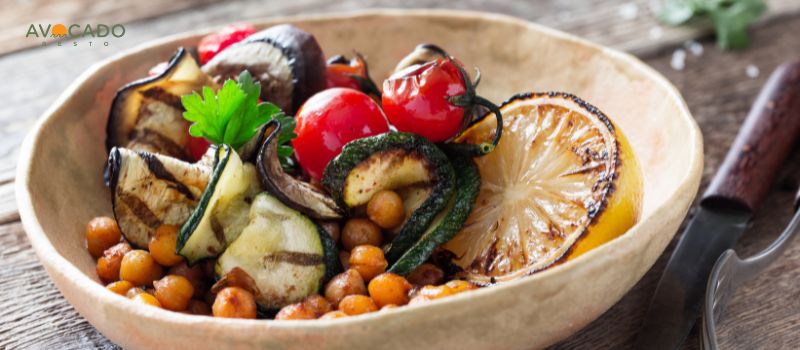Bali’s vibrant culture, lush landscapes, and deep-rooted connection to nature make it a haven for plant-based eating, where fresh, wholesome ingredients are celebrated in every dish.
Embracing a plant-based diet in Bali not only nourishes your body but also aligns with the island’s ethos of sustainability and harmony.
From the abundance of tropical produce to the innovative culinary scene, there are countless reasons to dive into plant-based eating while exploring this tropical paradise.
Here are six compelling reasons to make plant-based meals a staple during your Bali adventure.
Each of these reasons opens a window into why plant-based eating in Bali is both a delicious and meaningful choice.
1. Supports Your Health with Nutrient-Rich Ingredients
Bali’s plant-based cuisine is packed with nutrient-dense ingredients that promote overall wellness.
The island’s fertile volcanic soil produces an array of fresh vegetables, fruits, and herbs, from vibrant spinach and water spinach (kangkung) to antioxidant-rich moringa leaves.
Local staples like tempeh and tofu, made from fermented soybeans, offer high-quality plant protein, supporting muscle health and digestion.
Tempeh, in particular, is a probiotic powerhouse, aiding gut health due to its fermentation process. Dishes like gado-gado, a vegetable salad with peanut sauce, or sayur urab, a mix of steamed greens with spiced coconut, deliver vitamins, minerals, and fiber in every bite.
By eating plant-based in Bali, you’re fueling your body with wholesome, minimally processed foods that boost energy and vitality, perfect for keeping up with the island’s active lifestyle.
2. Aligns with Bali’s Sustainable and Spiritual Values
Bali’s culture is deeply rooted in the philosophy of Tri Hita Karana, which emphasizes harmony with nature, community, and the divine.
Plant-based eating naturally aligns with this ethos, as it reduces reliance on resource-intensive animal agriculture and honors the island’s reverence for the environment.
Many Balinese meals, especially those prepared for religious offerings, are inherently plant-based, featuring ingredients like rice, coconut, and jackfruit, which are offered to deities in intricately woven palm leaf baskets.
By choosing plant-based dishes, you’re participating in a tradition that respects Bali’s spiritual and ecological balance, fostering a deeper connection to the island’s cultural heritage.
Whether it’s savoring lawar made with young jackfruit or sipping a turmeric-infused jamu, you’re embracing a lifestyle that reflects Bali’s values.
3. Explores Bali’s Diverse Tropical Produce
Bali’s tropical climate yields a dazzling variety of fruits, vegetables, and herbs, making plant-based eating a delightful exploration of flavors and textures.
From sweet mangosteen and creamy durian to nutrient-packed soursop and snake fruit (salak), the island’s markets overflow with exotic produce that elevates plant-based meals.
Root vegetables like taro and cassava, along with lesser-known greens like cassava leaves, are staples in dishes such as bubur injin (black rice pudding with coconut milk) or jaje laklak (rice flour cakes).
In West Bali, you’ll find unique ingredients like wild ferns and banana blossoms, often transformed into flavorful curries or salads.
Eating plant-based in Bali allows you to discover these natural treasures, each bite showcasing the island’s agricultural richness.
4. Enjoys Bali’s Thriving Plant-Based Cafe Scene
Bali’s culinary scene is a global hub for plant-based dining, with cafes and restaurants offering creative, health-focused menus that cater to vegans and vegetarians.
In Ubud, spots like Clear Cafe on Jl. Hanoman serve vibrant smoothie bowls and tempeh rendang, while Canggu’s The Shady Shack on Jl. Tanah Barak offers plant-based burgers and jamu tonics.
In West Bali, cafes near Pemuteran and Menjangan Island incorporate local ingredients into dishes like urap-urap (spiced vegetable salad) and coconut-based desserts.
These venues combine Balinese flavors with global influences, creating dishes like jackfruit tacos or moringa-infused soups that are as visually stunning as they are delicious.
Exploring Bali’s plant-based cafes lets you indulge in innovative cuisine while supporting local businesses committed to sustainability.
5. Reduces Environmental Impact in a Fragile Ecosystem
Bali’s ecosystems, from coral reefs to rice terraces, are under pressure from tourism and climate change, making sustainable choices like plant-based eating more important than ever.
Producing plant-based foods requires significantly less water, land, and energy compared to animal-based products, reducing your environmental footprint.
For example, growing tempeh or jackfruit emits far fewer greenhouse gases than livestock farming, helping preserve Bali’s natural beauty.
In West Bali, where the West Bali National Park protects diverse flora and fauna, choosing plant-based meals supports conservation efforts by minimizing resource strain.
By opting for dishes like nasi campur with plant-based sides or coconut milk curries, you’re contributing to the preservation of Bali’s fragile environment for future generations.
6. Enhances Your Culinary Experience with Authentic Flavors
Plant-based eating in Bali is a gateway to authentic Balinese flavors, rooted in the island’s culinary traditions. Dishes like sambal matah (a raw shallot and chili relish) paired with steamed vegetables or pepes jamur (mushrooms wrapped in banana leaves) showcase the bold, aromatic spices that define Balinese cuisine, such as galangal, lemongrass, and kaffir lime.
In villages, you might encounter jaje sela, a sweet potato-based snack, or tipat cantok, a rice cake dish with peanut sauce, both highlighting the simplicity and depth of plant-based ingredients.
These dishes, often prepared with time-honored techniques, offer a sensory journey that connects you to Bali’s culinary heritage, making every meal a cultural experience.
Embracing a plant-based diet in Bali is more than a dietary choice it’s a celebration of health, culture, and sustainability.
From nutrient-packed dishes to eco-conscious dining, the island offers endless opportunities to savor plant-based cuisine while immersing yourself in its natural and spiritual beauty.
For a taste of this vibrant lifestyle, visit AVOCADO RESTO in West Bali, where you can enjoy fresh, plant-based dishes crafted with local ingredients, perfectly capturing the essence of Bali’s wholesome culinary scene.
